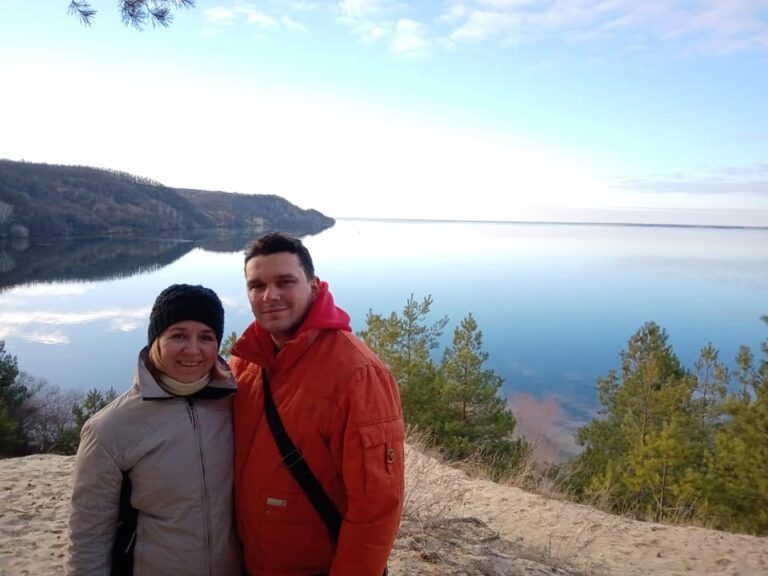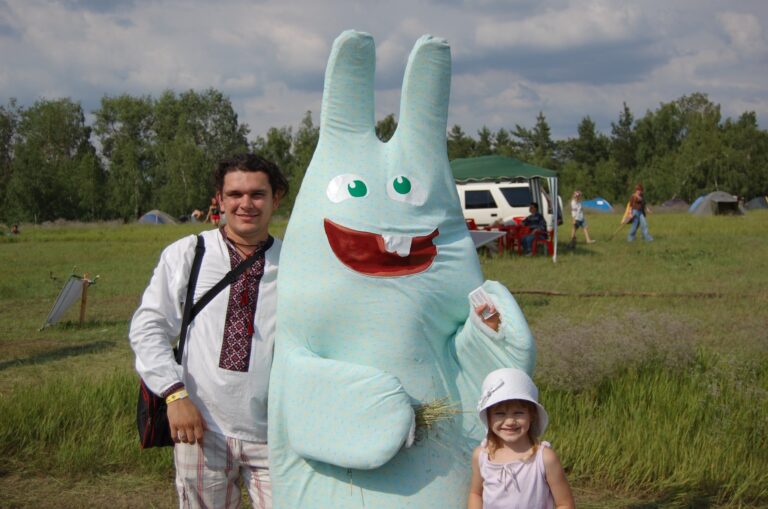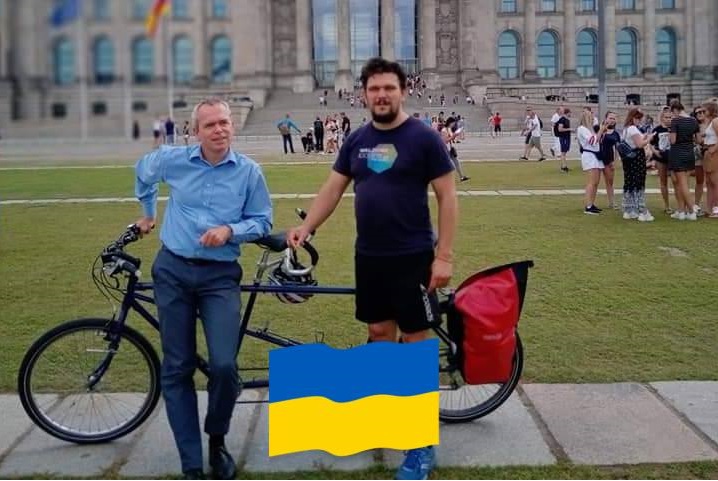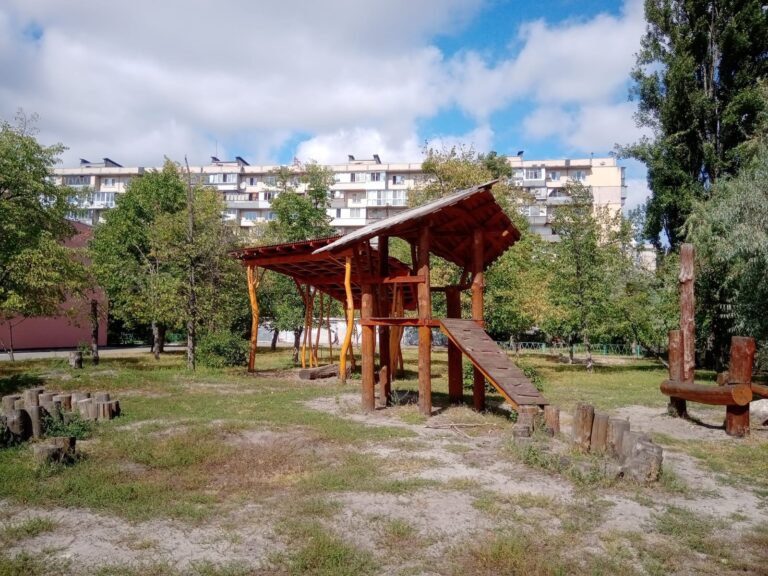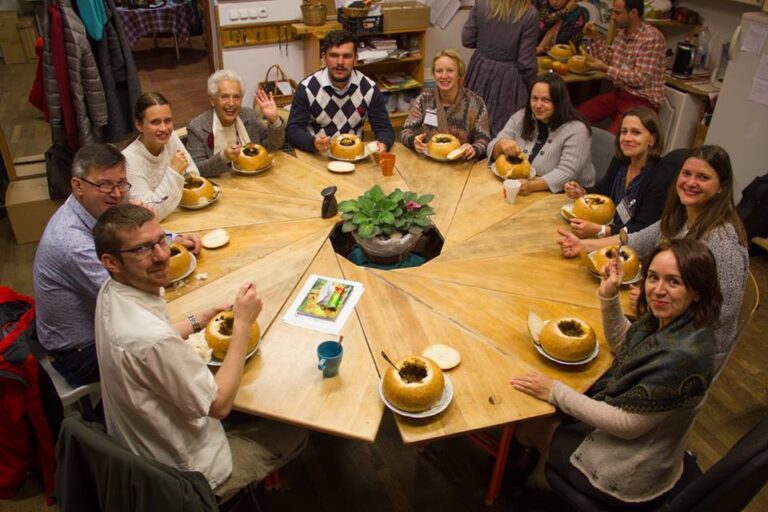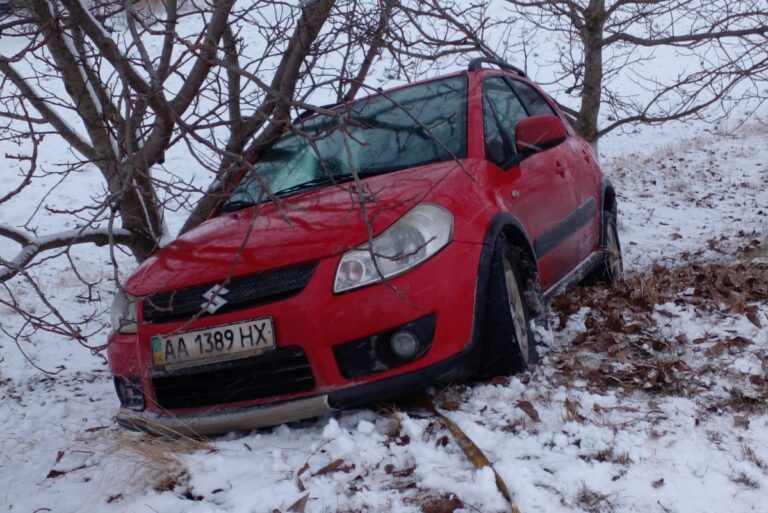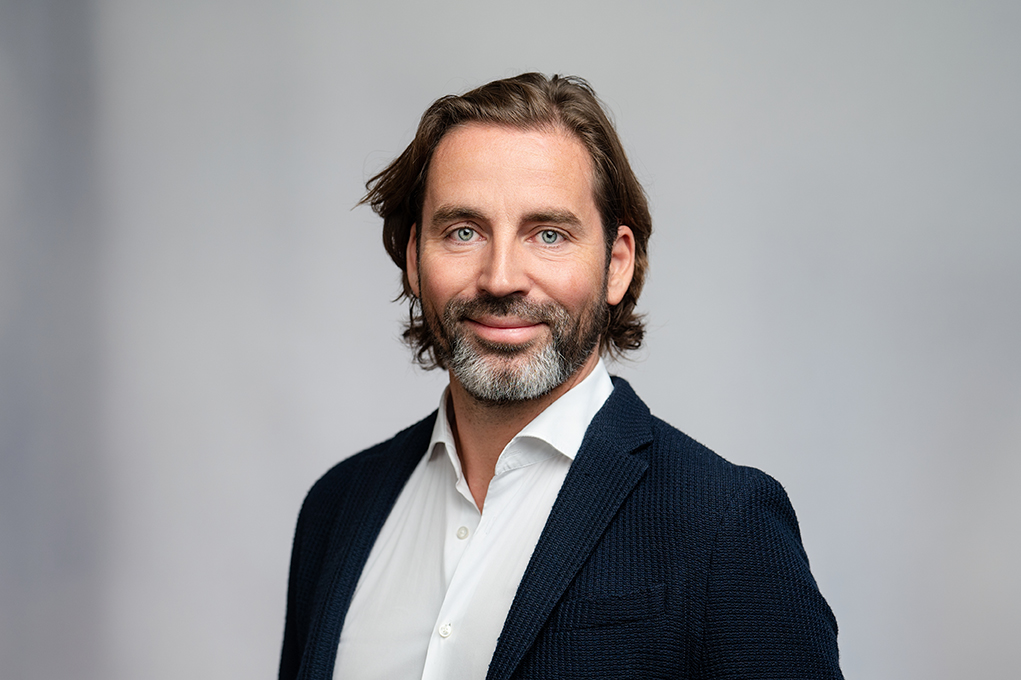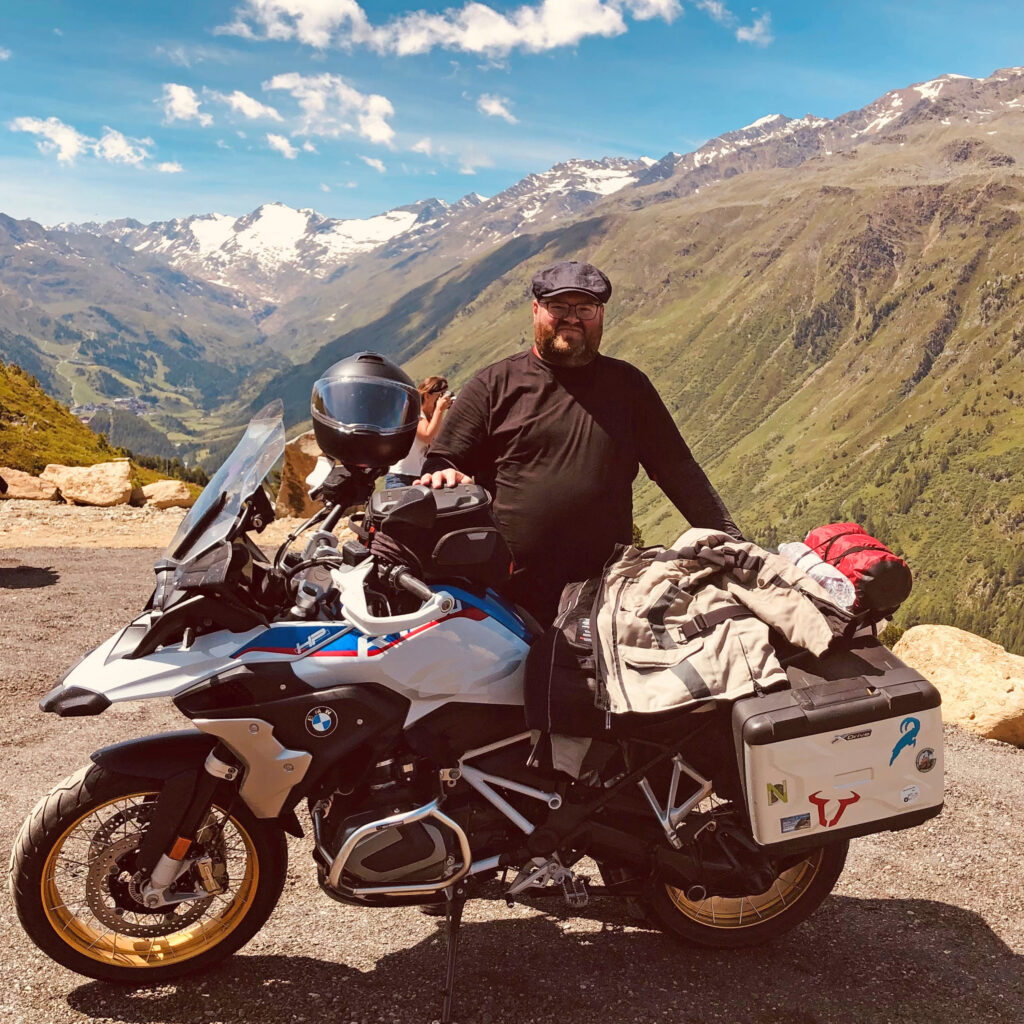“A job at a Red Cross company is a great reference in my C.V.”: Roman, IT Service Engineer from Ukraine
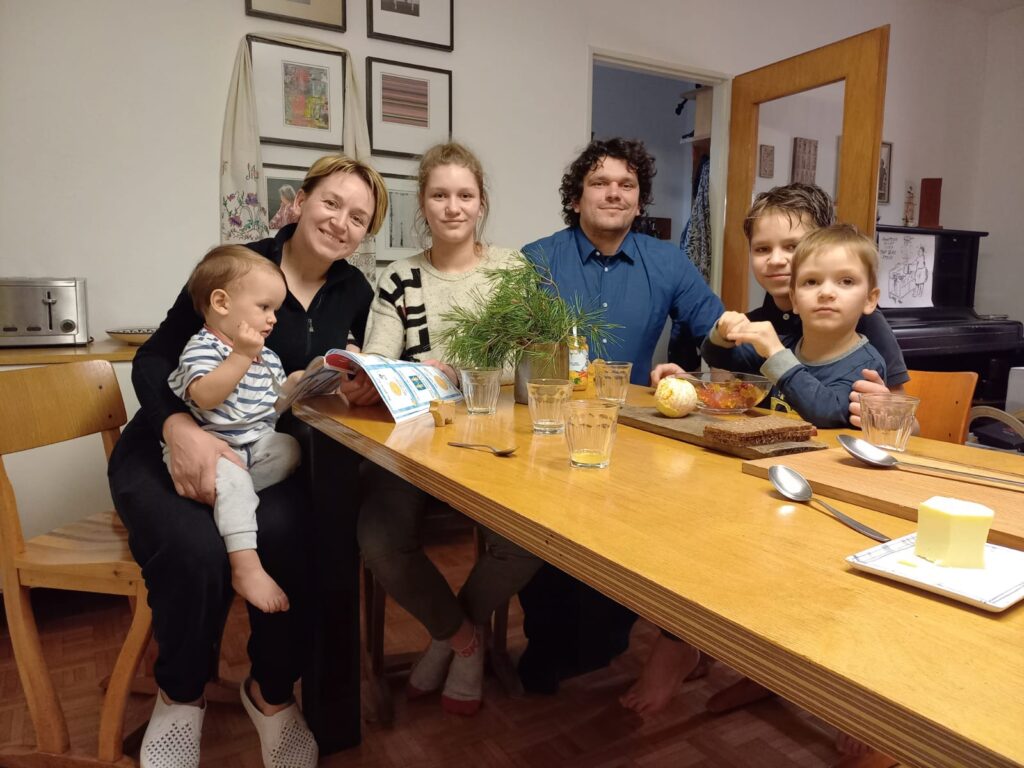
Roman from Ukraine came to Berlin in March 2022 because of the war and brought his wife and four kids with him. In December 2022 he started to work for DRK Kliniken Berlin as an IT Service Engineer. In this emotional interview he speaks about his career, his dreams, his family, their escape from Ukraine and their fresh start in Germany. Read the interview in English below or find the German translation here.
What were you doing before the war?
Until the pandemic began I was the IT Director of a travel agency in Kyiv. But the travel agency had to close down because of the pandemic, and I found a new job as an IT Service Engineer in a chicken factory in a village called Grigorovka 100km from Kyiv. I like to say “chicken factory”, because everybody smiles when I do, but it’s actually a big agricultural company called MHP and their Ukrainian chicken meat is sold even in German supermarkets.
I moved to Grigorovka with my wife and four kids. My wife is a nurse and had worked in a birthing center in Kyiv, especially caring for premature babies and mothers who didn’t have enough milk to feed their babies. When we moved to the village, she became head nurse, family therapist and massagist in the first aid center of the village. She was the only nurse within 20km. She had a lot of work to do and sometimes patients even came to our house at night because nobody else was able to help them.
Our children went to a Waldorf school, because when the oldest – Sofiia, who is now 16 years old – started school, the state schools in Ukraine were still working in a soviet tradition. They didn’t encourage creativity and free thinking. That’s why we decided to send the kids to a Waldorf school. I was head of the parents’ board and went to international meetings with the Waldorf community in countries like Germany, Hungary, Latvia and Italy.
Why did you decide to come to Germany?
The war came very unexpectedly. It’s not like in a movie where everybody understands what’s happening. One day we were having coffee with our friends, the next day we were in the middle of a war. We bought a lot a food supplies in order to be prepared. The rockets and aircrafts were flying very low above the ground, they were very loud and every time it happened you thought they were coming for you. But our village was quite safe. In Kyiv I saw the results of Russian rocket shootings. It was the time when Russian tanks came to Brovari, Gostomil, Bucha and Irpin.
I was worrying about the lives of my family and the education of my children. We sat down with my wife, older daughter and my parents and talked about what we should do. At the same time I got two letters from German friends from the Waldorf community. A letter from the CEO of Berlin Waldorf School and another one from an executive board member of the foundation “The Friends of Waldorf Education”. They said they would help us if we came to Germany. Knowing that and given the fact that my kids were learning German as a second language in school, it was an easy decision to go to Germany.
If you are interested in working for us as an IT Service Engineer, you may find our vacancies here.
How did you manage to escape from Ukraine?
The first task was finding petrol for our car, because there was almost none available. The second task was to decide which route to take. The quickest way from Kyiv to Germany is 1000km through Poland on the Jitomirska road, but we knew there were a lot of Russian tanks in some parts of this road. We decided to take a different route via Moldova, Romania and Hungary, which is 3000km. It turned out to be a good decision because some of the cars on the shorter route – even with children in them – were shot at. It was terrible.
It took us 15 hours to drive 400km from Kyiv to the Moldavian border in our little car. It was built for five people, but we were six and had luggage, so it was cramped. There were a lot of roadblocks. At one point we had almost no petrol left in the car. It’s really a miracle that we found a gas station which had actually gas left. If we had run out of gas, who knows if somebody would have helped us.
At the border we had to wait for 12 hours, because there were so many people waiting to leave the country. A lot of aircrafts flew above the cars and the sirens made a very loud noise. In Moldova, volunteers let us sleep in their traditional Moldavian village house for a night. It was nice and warm, which was good because it was snowing outside. The next morning we drove on and had an accident, because I was still so tired. The front window of the car broke, but we were able to go on to Romania.
I called some people from the Waldorf community and they let us stay in their houses in Timishuara (Romania) and near Lake Balaton (Hungary) for a few days until our car was repaired. Then we drove on to Berlin, where we arrived ten days after leaving Kyiv. We were extremely tired. All the time on the road I had been trying to reach about 30 parents from Kyiv Waldorf School who had also crossed the border with their families and to connect them with Waldorf school representatives in other European countries, Great Britain, Capri and the USA.
How did you get started in Germany?
We stayed at our friends’ – Friedrich and Magdalena – homes for a few months. They helped us with the registration and other documents. And most importantly, they registered our children for school and kindergarten. By the end of March the kids went to school. After six months of searching our friends found a little house near S-Bahnhof Zehlendorf for us to rent. It was magic! It’s an old house but very nice and warm. Unfortunately, the Landlord wants to renovate the house in the fall, so we’ll have to move out and look for another place to stay in August or September 2023. If anyone knows anything, we’ll be grateful for a hint!
My first job as an IT Engineer in Berlin I found at an English speaking IT company called KNIME. They develop software for analyzing big data and had started a project for refugees. KNIME and the owner Michael Berthold helped me and others a lot. About seven Ukrainian refugees were hired for his project and given work for six months. There was a girl who worked as a UA/UX Designer and a guy who had been working as a surgeon in Ukraine, quickly graduated in Germany and became a business analyst! KNIME helped with the documents that were necessary for us to be allowed to work in Germany.
Our international co-workers always have interesting stories to tell! Follow this link to read about Neil, our nurse from the Philippines.
How did you get your job at DRK Kliniken Berlin?
After six months, I had to look for a new job. I sent 200 applications and had 20 interviews. When I found the job ad of DRK Kliniken Berlin, I liked it very much, because there was a photo of Daniel Schmidt and his team and everybody was smiling. It felt very welcoming. The careers website was much nicer than other companies’ websites, too. When Daniel called me, I said: I have seen your photo! And he said that I have an interesting C.V. and experience in English-speaking IT companies and invited me for an interview. I am very grateful to Daniel Schmidt, Benjamin Lehman and the entire IT team for agreeing to support me for the first three months while I learn German. While I’m studying, we communicate in English.
My job is to set up new working desks with laptops and computers, install new software on PCs, care for network cables, switch configurations and more. We have to change memory cards in laptops, repair and set up printers and scanners, update printer drivers in Citrix and Windows 10. My colleagues are very nice. Mohamed and Lars explain everything to me, they teach me a lot. They are real “IT gurus” and do their work very well. Everything is easy to understand for me because it’s the same Microsoft software and devices I worked with in the chicken factory. On the 5th of January I began to take a German class and soon I will have to take an integration course in the evenings which will be demanding after eight hours of work.
What are your worries, dreams and plans for the future?
For me everything is good, because I learned foreign languages, travelled and saw other countries before the war. In the chicken factory we worked well structured like in German companies. Everybody came on time and was guided very well. So I don’t have too many problems with adaptation. As far as my job goes, I have a two-year-contract. In a few months, after I finish my German courses, I want to take some proposals to my team lead.
I like working in a big company because that means you have a lot of work to do. Also, the Red Cross is known internationally and working for a Red Cross company will be a great reference in my C.V.. Thinking long term, I want to be an IT Administrator and eventually lead a team. I imagine that in ten years I might be IT Director or headmaster of a Waldorf school. But right now I must work hard and with a lot of love every day helping doctors and nurses who save patients’ lives!
Moving to Germany gave me a lot of energy. For my family it’s different. My wife has to get her qualification as a nurse approved by German authorities and take an adaptation course, before she can work. Fortunately, the educational center of DRK Kliniken Berlin offered help. It’s important for her to find work, because after being at home with a baby for too long, women get depressed. Especially, if they have to worry constantly about finding a new apartment, learning German, everything being so expensive here, finding doctors, … We had to find a new dentist, because the first one didn’t take good care. For my wife, it’s a very big change.
Also, we are a little worried about our son Darii who is 12 years old. We hope his teachers will help him to quickly adapt and learn German, find new friends and a football team. I’m glad, that my older daughter Sofiia is doing well. She is in 10th grade in Waldorf school, has friends, her German level is A2. She is very engaged in her lessons and school projects. And the little ones – 2-year-old Radomyr and 5-year-old Svyatoslav – pick up German really fast, too.
Do you miss Ukraine?
Yes, I especially miss Kyiv, my friends, our village and our goats! Our village is located in a very beautiful place on the banks of the Dnipro river, on the Trakhtemyriv Peninsula, 100 km from Kyiv. In Grigorovka we had a little goat farm. It was my daughter Sofiia’s idea. She had always wanted to have animals. At first we bought three goats. Then the neighbors gave us theirs to take care of and they had babies and in the end we had more than 20 goats and produced our own cheese. Goats are very intelligent animals, like dogs. They jump up and down and they follow you, when they like you. We had to leave them with our friends and I miss them. But then again… Grigorovka village life is nice in the summer. In the winter when the roads are muddy and you have to cut firewood it’s not so nice anymore. I’m glad that now I’m here in Berlin.
But I miss my friends and colleagues at MHP and try to call them once a week. After I got my first salary in Germany, I began to support my friends who fight as soldiers in Ukraine. I trust that this year Ukraine and the European civilization will win and no one will die in a war that no one needs anymore!
Interview: DRK Kliniken Berlin / Maja Roedenbeck Schäfer
Die Top 3 Blogartikel zum Thema IT
WIRschlagen Dir passende Jobs vor
Nur wenn Du einen der unter „Beruf auswählen“ aufgeführten Berufe gelernt hast und Deine Berufsurkunde vorlegen kannst, kannst Du die Schnellbewerbung nutzen. Wir melden uns dann bei Dir! Mit einem anderen Beruf bewirb Dich bitte über unsere Stellenbörse.
